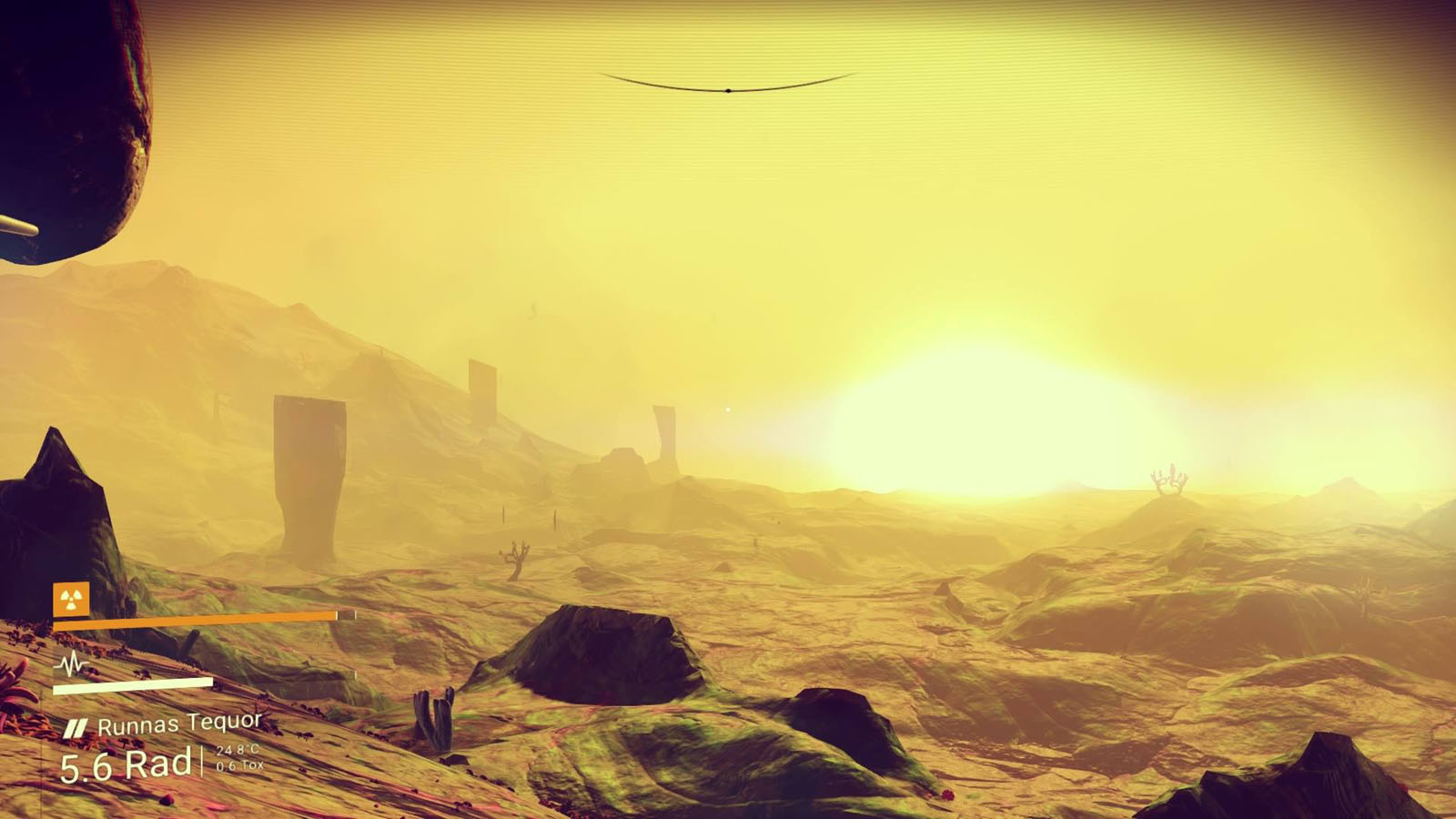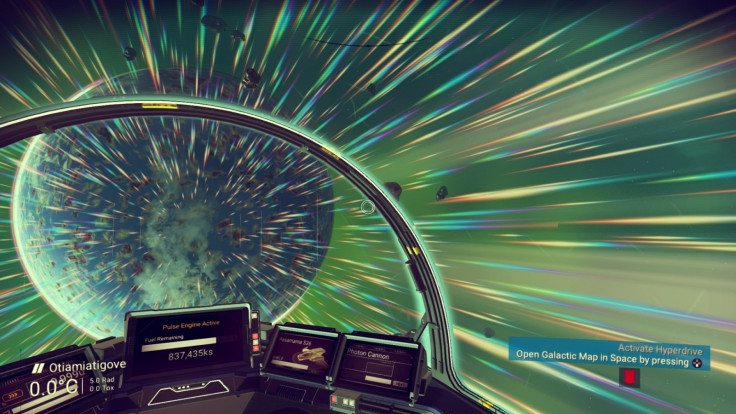No Man's Sky review: Hello Games delivers an entire stunning galaxy to explore on PS4 and PC
British studio Hello Games has seeded a whole universe in No Man's Sky, one of the most highly-anticipated games of the year.
No Man's Sky
Platforms: PS4 (tested), PC
Developer: Hello Games
Publisher: Hello Games
Release Date: Out now
Where To Buy
Amazon / Tesco / ShopTo / PlayStation Store / Steam
There may never be a game like No Man's Sky again. From its jaw-dropping announcement to its belated launch, it has existed outside of convention. Made by fewer than 20 people at British outfit Hello Games, the final product is undoubtedly indie, but with industry leaders Sony propping it up, it has enjoyed the marketing and fanfare of a major exclusive.
It is the most high-profile indie release ever, but the main reason there's unlikely to be anything like No Man's Sky again is the game itself. Hello Games has delivered a practically-infinite galactic setting comprised of procedurally generated planets and moons, housing procedurally generated flora and fauna.
Hello Games' tech regularly produces stunning vistas: suns rising over alien worlds, space stations coming into view, caves busy with crystalline oddities. A colourful palette helps bring everything to life, and offsets the regularity of samey worlds. I've seen a fair amount of largely barren, hilly worlds, but I've also seen the kind of weird alien environments that give No Man's Sky its hook, and have also heard from other players about sights I have yet to see first-hand.
No Man's Sky is sold on the promise of limitless possibilities, and the likelihood that your discoveries will only be seen by a few others. Not knowing what might be in the next system, on the next planet or over the next hill, inspires the urge continue exploring; to discover worlds with huge rock structures stretching out over the landscape like tendrils, goofy, ungainly creatures hovering with comically small wings, or groups of mushroom-looking critters frolicking in a field.
Each discovery, be it a star system, world, animal, plant or point of interest, can be uploaded to the "Atlas" - a mysterious force central to the game's intriguing lore – to be shared with other players exploring their own little corners.
A sense of discovery runs through the game, but simply traveling from planet to planet, hoping something interesting is there wouldn't be enough. The moment-to-moment gameplay that underpins exploration is about mining and crafting, and this is where No Man's Sky has divided its audience.
Base elements and rarer materials are scattered throughout the galaxy in plants, rocks, crates and more. They are also available to purchase at galactic trading posts. These materials are mined with a laser attached to the player's multi-tool, and they're used either as fuel, as ammunition or to build more complex crafting materials. Mining is oddly satisfying in that Minecraft way, and it needs to be to take the edge off what often amounts to a grind – especially in the game's early stages.
These materials, along with other items and upgrades, are stored in inventory slots on your exosuit and in your ship. Your suit can be upgraded with more slots at stations found throughout the galaxy, while ships are upgraded by making an offer to the pilot of any you happen across, or by finding and fixing up one that has crash landed. A third tab on the inventory screen is allocated to the multi-tool, which can't be used as storage, but which can also be upgraded to allow more slots for future upgrades.
The first hours of No Man's Sky are spent grappling with these crafting and inventory systems at the expense of the sense of discovery. As storage capacity does improve however, and as players acclimatise to the very deep system, a balance is struck and the game finds a rhythm. Improvements could be made however. The ability to better track down specific materials and an additional method of storage – a Destiny-style vault for example – would both be welcome.
When players arrive on a planet, points of interest appear, always coaxing one more little excursion before jetting off to a new location. These constructs are consistent throughout the cosmos: there are outposts, pods housing exosuit upgrades, crashed ships, trading posts and the relics and totems of alien races.




At the latter, and through other means, players can learn singular words of one of three alien languages. These unlock the meaning of conversations with characters found in outposts in in ships, that are otherwise interpreted by mannerisms the player character dictates in a first-person, choose-your-own adventure style. Building relationships and gaining a better understanding of alien species is an underrated aspect of the game, which lends the galactic setting a sense of cohesion and life.
It's one of two other substantial gameplay features beyond the core gameplay loop. The other is combat, which on planet and off is functional but not exactly spectacular. Were more of the game dependent on it, it'd be more of a problem.
So, that loop I've been talking about. Players scour planets, mine resources, build upgrades and travel to the next star system where they'll repeat the process. As more time with the game is logged it becomes easier to approach things in different ways (destroying trade ships to get materials rather than mining for example) but the cycle remains the same. For some, the loop doesn't offer enough, but its befitting of a game that's a more passive experience than many had expected.
No Man's Sky is a fantastic game to play on a lazy afternoon. Getting to grips with its deep crafting system is demanding, but once settled, players dictate the challenge they face in the same way they dictate their goals and destinations.
For example, having found a planet rich in valuable resources I located an area ripe for farming with a trading post nearby. Because of the value of these items, mining just one alerted the viscous, galaxy-protecting sentinels – so I was left making mad runs through the surrounding hills and back to safety in an effort to make a cool 3 million units.
Sharing those stories, and screenshots of the sights you've seen and oddities you've encountered, is a huge part of what makes No Man's Sky work. It's not immediately multiplayer (through the unlikelihood of meeting another player, or possibly through the omission of such a feature entirely) but it is a game to be shared with others. For months, maybe even years to come, players will be discovering and sharing the treasures of Hello Games' incredible universe.
No Man's Sky is about cutting your own path through a galaxy teeming with possibilities. It is a playground in which you have free rein to indulge the human urge to explore and discover, supported by a deep crafting system that keeps players engaged in their journey. Improvements could be made, new features could add greater depth, but Hello Games' achievement here is nothing short of incredible.
For all the latest video game news follow us on Twitter @IBTGamesUK.

© Copyright IBTimes 2025. All rights reserved.





















